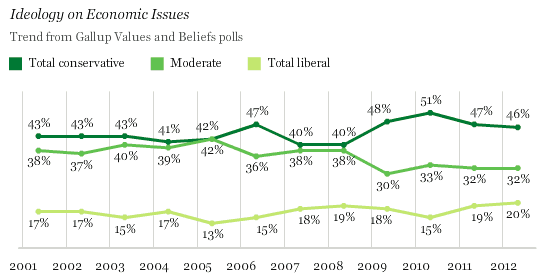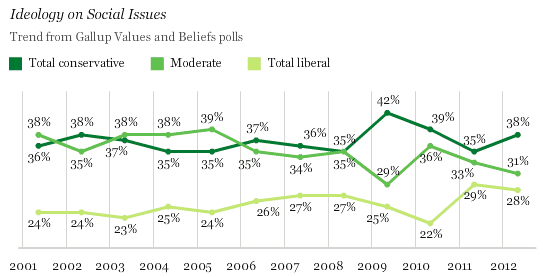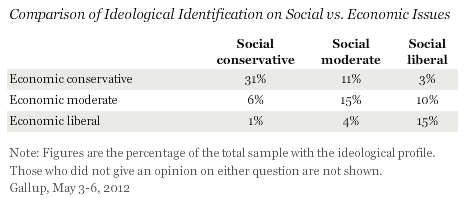PRINCETON, NJ -- Americans are more than twice as likely to identify themselves as conservative rather than liberal on economic issues, 46% to 20%. The gap is narrower on social issues, but conservatives still outnumber liberals, 38% to 28%.
![Thinking about economic issues, would you say your views on economic issues are -- [ROTATED: very conservative, conservative, moderate, liberal (or) very liberal]? Thinking about social issues, would you say your views on social issues are -- [ROTATED: very conservative, conservative, moderate, liberal, (or) very liberal]?](http://content.gallup.com/origin/gallupinc/GallupSpaces/Production/Cms/POLL/jtahi7dz2koy5vzaqnql6a.gif)
These results are based on Gallup's annual Values and Beliefs poll, conducted May 3-6. Since 2001, the poll has asked Americans to say whether they are liberal, moderate, or conservative on "economic" and, separately, "social" issues. The interpretation of what qualifies as social or economic issues is left to the respondent, given that the question does not define or provide examples of these types of issues.
In the same poll, on Gallup's standard measure of ideology -- not asked in reference to any set of issues -- 41% identified themselves as conservatives, 33% as moderates, and 23% as liberals. Those figures are similar to what Gallup typically finds when it asks people to identify their ideology.
Thus, compared with the standard measure of ideology, slightly more Americans say they are economically conservative and slightly fewer say they are socially conservative. Also, significantly more Americans say they are socially liberal than identify their basic ideology as liberal.
More Americans Identifying as Economic Conservatives
Over the last four years, an average of 48% of Americans have said they are conservative on economic issues, including a high of 51% in May 2010. From 2001-2008, an average of 42% said they were economically conservative. This increase in economic conservatism has been coupled with a decline in the percentage who say they are moderate on economic issues. There has also been a slight increase in the percentage of Americans identifying as economic liberals, to a high of 20% this year.

The changes in self-identified economic conservatism coincide with the economic downturn and President Barack Obama's time in office. But because the jump occurred between 2008 and 2009, and Americans were already concerned about the economy in 2008, the change in presidential administrations from Bush to Obama may be the bigger factor.
Social Moderates Declining
The major shift in Americans' identification on social issues in recent years has been a decline in the percentage who say they are moderate, from 39% as recently as 2005 to 31% today. There have been roughly equal increases in the percentage of self-identified social liberals (four percentage points) and social conservatives (three points) today compared with 2005.

Most Americans Are Ideologically Consistent
For the most part, Americans fall on the same ideological side on economic and social issues. Sixty-one percent are conservative, moderate, or liberal on both dimensions, with the largest percentage, 31%, conservative on both. Fifteen percent are liberal on both social and economic issues, and 15% are moderate on both.

The bulk of those who are not consistent say they are economically conservative and socially moderate (11%), or economically moderate and socially liberal (10%). Only 4% are liberal on one dimension and conservative on the other, with most of those being economically conservative and socially liberal.
Implications
More Americans identify as economic conservatives than as social conservatives or conservatives in general. And that tendency has increased in the last four years, perhaps due to President Obama's economic agenda. This suggests that a conservative economic message from Republican presidential candidate Mitt Romney may resonate with voters this year.
Americans are also more likely to say they are conservative than liberal or moderate on social issues, underscoring the conclusion that the conservative label has more appeal in the United States today than either the moderate or the liberal label.
Also, the moderate label seems to be losing some of its appeal in recent years, as Americans have become less likely to say they are moderate on both social and economic issues. The movement away from the moderate label may be another example of the increasing polarization of U.S. politics.
Survey Methods
Results for this Gallup poll are based on telephone interviews conducted May 3-6, 2012, with a random sample of 1,024 adults, aged 18 and older, living in all 50 U.S. states and the District of Columbia.
For results based on the total sample of national adults, one can say with 95% confidence that the maximum margin of sampling error is ±4 percentage points.
Interviews are conducted with respondents on landline telephones and cellular phones, with interviews conducted in Spanish for respondents who are primarily Spanish-speaking. Each sample includes a minimum quota of 400 cell phone respondents and 600 landline respondents per 1,000 national adults, with additional minimum quotas among landline respondents by region. Landline telephone numbers are chosen at random among listed telephone numbers. Cell phone numbers are selected using random-digit-dial methods. Landline respondents are chosen at random within each household on the basis of which member had the most recent birthday.
Samples are weighted by gender, age, race, Hispanic ethnicity, education, region, adults in the household, and phone status (cell phone only/landline only/both, cell phone mostly, and having an unlisted landline number). Demographic weighting targets are based on the March 2011 Current Population Survey figures for the aged 18 and older non-institutionalized population living in U.S. telephone households. All reported margins of sampling error include the computed design effects for weighting and sample design.
In addition to sampling error, question wording and practical difficulties in conducting surveys can introduce error or bias into the findings of public opinion polls.
View methodology, full question results, and trend data.
For more details on Gallup's polling methodology, visit www.gallup.com.
